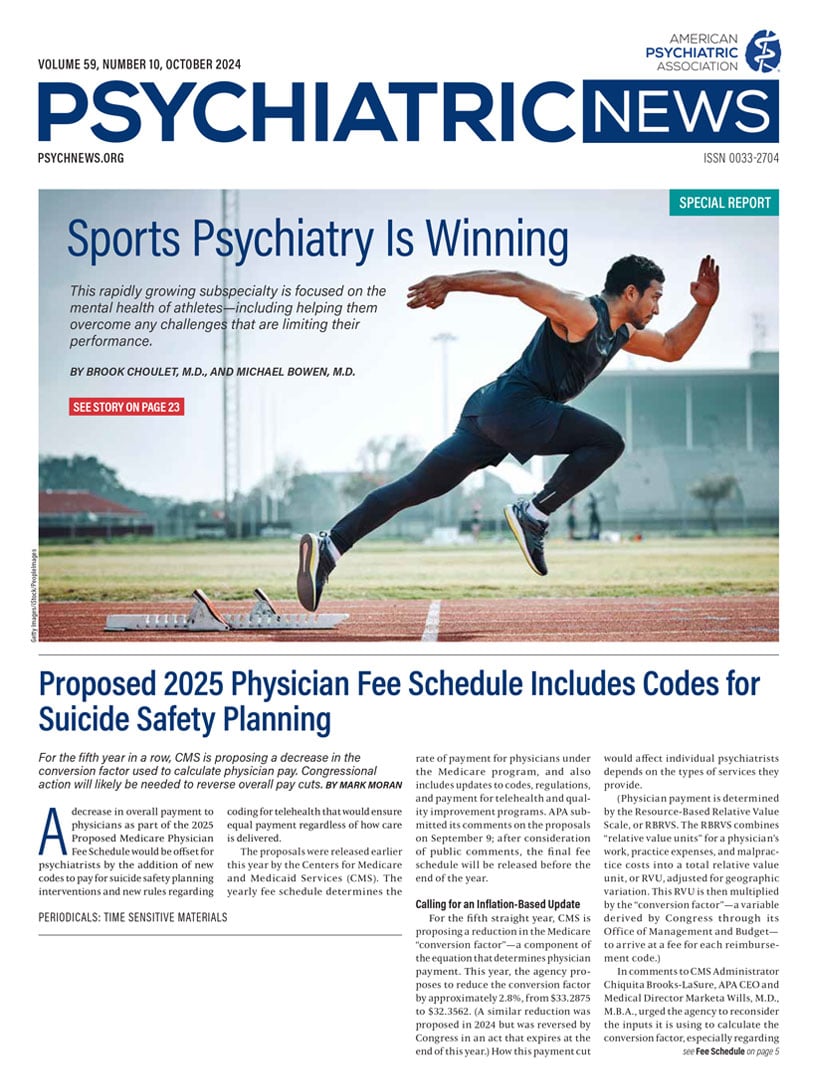A decrease in overall payment to physicians as part of the 2025 Proposed Medicare Physician Fee Schedule would be offset for psychiatrists by the addition of new codes to pay for suicide safety planning interventions and new rules regarding coding for telehealth that would ensure equal payment regardless of how care is delivered.
The proposals were released earlier this year by the Centers for Medicare and Medicaid Services (CMS). The yearly fee schedule determines the rate of payment for physicians under the Medicare program, and also includes updates to codes, regulations, and payment for telehealth and quality improvement programs. APA submitted its comments on the proposals on September 9; after consideration of public comments, the final fee schedule will be released before the end of the year.
Calling for an Inflation-Based Update
For the fifth straight year, CMS is proposing a reduction in the Medicare “conversion factor”—a component of the equation that determines physician payment. This year, the agency proposes to reduce the conversion factor by approximately 2.8%, from $33.2875 to $32.3562. (A similar reduction was proposed in 2024 but was reversed by Congress in an act that expires at the end of this year.) How this payment cut would affect individual psychiatrists depends on the types of services they provide.
(Physician payment is determined by the Resource-Based Relative Value Scale, or RBRVS. The RBRVS combines “relative value units” for a physician’s work, practice expenses, and malpractice costs into a total relative value unit, or RVU, adjusted for geographic variation. This RVU is then multiplied by the “conversion factor”—a variable derived by Congress through its Office of Management and Budget—to arrive at a fee for each reimbursement code.)
In comments to CMS Administrator Chiquita Brooks-LaSure, APA CEO and Medical Director Marketa Wills, M.D., M.B.A., urged the agency to reconsider the inputs it is using to calculate the conversion factor, especially regarding physician practice costs, which are rising. (The American Medical Association
notes in a summary of the proposed rule that the estimated 2025 Medicare Economic Index—a measure of physician inflation in physician operating costs—will be 3.6%.)
“Maintaining a practice, particularly for those psychiatrists treating large numbers of Medicare or dually eligible beneficiaries, has become unsustainable due to annual Medicare payment cuts (2.8% proposed for 2025), potential payment reductions under the Merit-based Incentive Payment System (MIPS), rising practice costs, and long-standing and well-documented policies of private health insurers paying psychiatrists on average 24% less than other physicians,” Wills wrote. “The Medicare Physician Fee Schedule is one of the only Medicare-funded programs that does not include an inflationary update annually.”
In the meantime, it is likely that congressional action will be required to reverse the proposed payment cut; APA is urging members to contact their representatives. Look for future updates from Psychiatric News.
New Coding and Payment Rules
A number of other CMS proposals are more positive. For instance, CMS proposes new coding and payment rules for safety planning interventions for patients in crisis in a variety of settings—including those with suicidal ideation or at risk of suicide. Suicide planning interventions can include assisting the patient in following a personalized safety plan and engaging family members and friends to help resolve the crisis. An additional monthly code, GFCI1, would support specific protocols for follow-up phone calls after discharge from the emergency department for a crisis encounter.
Under the proposed rule, CMS would also allow physicians to continue to use existing outpatient evaluation and management billing codes for telehealth—including audio-only telehealth. An important advocacy victory for APA, this means telehealth services would be paid equally regardless of how care is delivered. (At APA’s urging, CMS rejected a proposal for the addition of 16 separate telehealth codes that might have reduced payment for some services.) CMS is also proposing to extend audio-only telehealth, currently reserved for mental health services, to any medical service. ■
